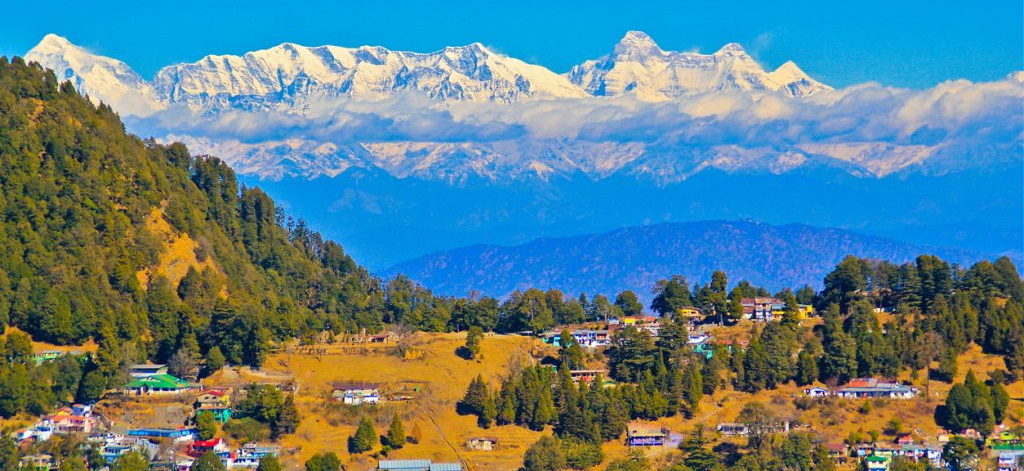
Mukteshwar Agro-Farm Resort
“There are many places in Kumaon where a fortnight’s holiday could be pleasantly spent. Mukteshwar is the most beautiful & picturesque place in Kumaon”. – Jim Corbett-
Altitude of 2171 meters (7500 feet) sprawled over 7 acres of land, our farm resort is nature lover’s paradise, a delight for travellers and photographers alike. The expansive resort is perched on a hill top with a panoramic view of the snowcapped Himalayas. Our Agro-farm is home to multiple fruit orchards and varieties of flora. This capacious resort is surrounded by the peaks on all sides and provides breathtaking views. Away from the hustle and stresses of city life, one can rejuvenate one’s mind, body and soul here.
SEASONS:-
Winter: cold and snowy but best time for bird watching and snow fall experience.
Summer: April to June: pleasant days with cool nights. Ideal time for village walk, farming experience, Mountain trek and nature relaxation.
Monsoons: July to September: Rainy days but panoramic view. Right time for farming experiences. September is good for observing flora and fauna.
ACCESS:-
- Kathgodam Railway station- approx. 54kms
- Panthnagar Airport- approx. 90kms
- Nainital – approx.50kms
- Delhi- approx. 355kms
| Total Room | Tariff Per night | Meal Plan | Access | Approx altitude |
|---|---|---|---|---|
| 16 | 4200 on twin sharing basis Extra bed- 1000 |
MAPI | On Road | 2160 Mts. |
Village activity - Farming Experiences (150 INR per head), village walk (500 INR per head), pahadi Chulla meals (350 INR per head).
Adventure activity - Thakud top summit and camping (3000 per head), Bhalugar trek (1000 per head), Day cycling with pack lunch (1500 per head).
Bird watching - Naturalist charge (3000 INR per day).
GUIDELINES FOR OUR GUEST
- As an eco-tourist, travel, respecting local culture and traditions and encouraging local pride—local cuisine, folk songs and dance, traditional dresses, local etiquette, local architecture. There is a science (gharat) and art (colour) in everything. Be friendly, inquisitive and patient. Respect holy places.
- Understand that leakage of economic benefits outside the community due to non-local ownership of tourism business is bad. Give a fair price to rural produce by buying local.
- Think eco-systems—be conservation conscious. Support friendly resource usage—water through rain water harvesting, use of non-conventional energy; if electricity is unavailable, use energy-efficient kerosene stoves.
- Be environmental sensitive respect biodiversity. Respect carrying capacity of the physical environment and the resources, knowing that overcrowding leads to a lessening of the tranquility and simplicity of life that attracts you in the first place.
- Make positive contributions to the conservation of natural and cultural heritage, maintain local harmony. Help the guides and porters to observe eco-conservation measures. Remember that erosion of cultural integrity and values due to the introduction of ‘outside’ influences is ruinous to indigenous cultures. Avoid over-use of community infrastructure.
- Keep local water sources clean and avoid using chemical detergents in streams or springs. If no toilet facilities are available, make sure you defecate atleast 30 metres away from any water source, ensuring to bury any waste. Conservation of water is vital, especially drinking water. Water from Kitchen waste or rain-water through regular harvesting be used for sanitation and use, where quality of water required is not very high. Water source should not be contaminated in any way.
- Keep travel-generated garbage at the minimum. Composts, recycles and reduced pollution are what must be practiced. Proper disposal must only be at appropriate points along the route. Leave no eye-sores. ‘Leave no trace’ principle be followed. Camping areas should be left cleaner than what you saw when you came. Remember that another party would be using the camp site after your departure. Differentiate between non & biodegradable garbage. Burn or bury paper, natural refuse and litter. Keep for recycling and don’t throw away any non-degradable garbage like plastic bags, foil, packets, glass bottles and metal cans
- See that no damage is done to vegetation. Taking away cuttings, seeds and roots without permission of the authorized persons is illegal, especially in nature reserves. Stop people from plucking flowers or leaves. They should be left as they are for all to enjoy. As much as possible keep to the treks/trails/hikes and avoid stepping on to vegetation—you destroy vital biodiversity. Avoid collecting souvenirs. Reduce impact, keeping to marked routes and paths.
- Damage to trees/vegetation must not be there. Do not carve initials on trees or spray graffiti on monuments — defacing rocks is pollution and the Apex Court too took badly to it.



